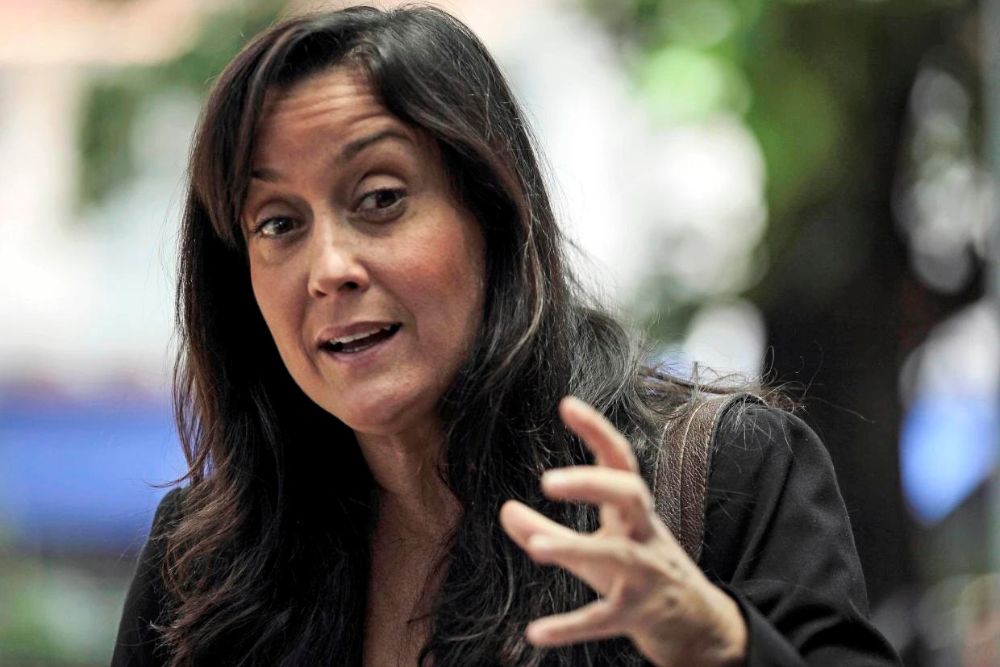The ICJ today called on the Venezuela authorities to immediately release arbitrarily detained lawyer and human right defender Rocio San Miguel, to drop the charges against her, and to end the harassment and persecution of her and other human right defenders in the country.
On 9 February officers of the Bolivarian Intelligence Service (SEBIN) arrested Rocio San Miguel and her daughter at the Caracas airport. The Chief Prosecutor after more than two days publicly acknowledged San Miguel’s detention but did not provide information on her or her daughter’s whereabouts. Her enforced disappearance is part of a pattern of enforced disappearances occurring in the country.
The ICJ is concerned that the arrest has been undertaken in connection with her legitimate professional activities, including as Chair of Control Ciudadano para la Seguridad y Defensa, a local NGO that promotes accountability for security and military forces in Venezuela.
“Rocio San Miguel’s arrest is the latest example of how Venezuela’s authorities have assaulted the rule of law by instrumentalizing the criminal justice system to intimidate and harass critics’ voices from civil society”, said Santiago Canton ICJ’s Secretary General
After receiving no response to request for information to police and intelligence agencies about her whereabouts, San Miguel’s lawyers filed a habeas corpus petition to the Criminal court on 12 February, alleging that she, her daughter and other family members were victims of enforced disappearance. Late on the same day, the Chief Prosecutor publicized through social networks that Rocio San Miguel was attending a hearing at the counter-terrorism tribunal linked to alleged commission of the crimes of treason, conspiracy, terrorism, and association, and that his office had requested her detention. San Miguel’s chosen lawyer was not permitted to attend this hearing, access the case file or communicate with her.
On 13 February, San Miguel’s lawyers reported through social networks that her daughter and other relatives that were detained had been released, but continued to be subject to investigation and were required periodically present themselves before a court, were prohibited from leaving the country or address the media about their case. These restrictions appear to constitute an arbitrary and unlawful restriction on their rights to freedom of expression protected under international law.
Ms. Rocío San Miguel is currently deprived of her liberty allegedly at the Bolivarian Intelligence Service facilities at “El Helicoide”, a detention center where detainees have a well-documented high risk of torture. Her lawyers of choice have been unable to communicate with her.
“Human rights defenders play a critical role in the defense of democracy and the rule of law and must never be the subject of attack or reprisal their criticism of public authorities or practices in a country where the rule of law is severely damaged,” said Santiago Canton, ICJ’s Secretary General. “Using the criminal justice system as an instrument of political repression is yet another stain on an already damaged rule of law”, added Canton.
The ICJ calls on Venezuelan authorities to immediately release Rocio San Miguel, drop all charges against her, and as long as she is detained, to ensure that she is not subjected to any form of ill-treatment allow her full and confidential access to her legal counsel and all rights of defense.
Background
Rocio San Miguel’s arrest, prosecution and persecution are part of the closure of civic space and the crackdown of the rule of law in Venezuela, which includes attacks against human rights defenders and civil society organizations. This situation has been widely documented by several Inter-American Human Rights and UN bodies and mechanisms, including the International Independent Fact-Finding Mission (FFM) established by the UN’s Human Rights Council in 2019, which has documented alleged crimes against humanity.
Rocio San Miguel has received the protection of precautionary measures prescribed by the IACHR since 2012, due to being “victim of harassment and threats, including death threats she received at her home, as a consequence of her activities as a member of the non-governmental organization Control Ciudadano”. She was one of the victims in the Case of San Miguel Sosa et al. v. Venezuela handed down by the Inter-American Court of Human Rights in 2018, where Venezuela was found responsible for the violation of the right to political participation in relation to the principle of non-discrimination. Several UN Human Rights Council independent experts (Special Procedures) expressed concerns about attacks against her in 2015.
International law and the Venezuela Constitution guarantee, among other rights, the right to liberty, fair trial, as well as the prohibition of incommunicado detention, enforced disappearance, and torture and cruel, inhuman or degrading treatment.
Venezuela is party to the International Convention Against Torture, the International Covenant on Civil and Political Rights (ICCPR), the Convention on the Elimination of Discrimination against Women, the Inter-American Convention on the Prevention, Punishment, and Eradication of Violence against Women “Convention of Belem do Pará, and the Inter-American Convention on Enforced Disappearance of Persons, among others.
Recently, the United Nations Human Rights Committee, in its evaluation of the fifth periodic review of Venezuela’s compliance with the ICCPR, that it was:
“seriously concerned by reports of cases of enforced disappearances, including those of short duration, extrajudicial and summary executions and other forms of unlawful use of force attributed to State authorities, armed forces, civilian and military intelligence services (…) Also of concern are allegations of the arbitrary use of detention and arbitrary deprivation of liberty, including incommunicado detention in covert locations known as “casas clandestinas” (clandestine houses), in which basic minimum legal safeguards are not respected, and deprivation of life on political grounds or of persons viewed as opponents of the Government. The Committee is concerned about the alarming degree of impunity surrounding the reported cases and deeply regrets that the delegation denied these allegations and criticized the sources of the allegations of enforced disappearances and extrajudicial executions in its dialogue with the Committee”.




